Saturday, June 8, 2013
Year-End Celebrations and The Legacy of Peter Briggs
Letterwinners Dinner
There were two ladies from the squash team nominated for prizes at the senior Letterwinners’ Dinner last week. Before each winner was announced, the presenters spoke about each of the nominee’s accomplishments as our seniors and their families braced in suspense. It was exhilarating for all the players and families when Laura Gemmell was announced as the winner of the Radcliffe Prize and Sarah Mumanachitt announced for the Arthur C. Boland Prize. Both have been outstanding players, teammates, and members of the Harvard community as a whole. Mike, Reggie and I couldn’t be more proud of them for going above and beyond as Harvard student-athletes.
Here are excerpts from the press release on gocrimson:
Laura Gemmell of the women’s squash team garnered the Radcliffe Prize as Harvard’s outstanding female athlete. Gemmell was a dominant force on the squash courts during her four years in Cambridge. The Toronto native burst onto the scene as a freshman, going a perfect 16-0 to win the CSA Individual National Championship and earn Ivy League Rookie and Player of the Year honors. The Crimson also went undefeated that season, finishing 12-0 to claim the national title and Ramsay Cup for the first time since 2000-01. The program’s resurgence continued as the squad went 45-3 over the past four seasons with three team national championships and two Ivy League titles. Individually, Gemmell was a four-time CSA first team All-American and All-Ivy selection, a three-time Academic All-Ivy recipient and a two-time Ancient Eight Player of the Year.
Women’s squash co-captain Sarah Mumanachit earned the Arthur L. Boland prize, given annually to a senior attending medical school who also best exemplifies the characteristics and qualities of the award’s namesake. While compiling a career record of 47-8 and helping the Crimson win three national championships and two Ivy League titles, the neurobiology concentrator also spent time researching in the Boston Children’s Hospital Lab of Cognitive Science and shadowing medical workers in Thailand after receiving the David Rockefeller International Experience Grant.
Check out the full article here.
 |
| (L to R) Sarah Mumanachit, Jason Michas, Alex Ma, Laura Gemmell, Shaw McKean, Natasha Kingshott |
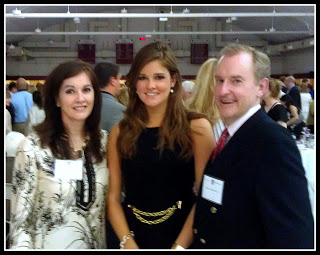 |
| Natasha with her parents, Sonia and Adrian Kingshott |
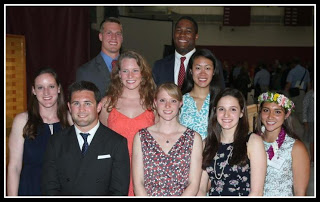 |
| The award winners, including Laura Gemmell (bottom row, 2nd from end on right) and Sarah Mumanachit (middle row, right) |
Commencement
At 5:30 am on Commencement Day, the students were roused from their beds by blaring bagpipes outside their windows. It was just the start of the pomp and circumstance surrounding the distribution of diplomas. It was a long, hot day of fanfare and speeches and many of the students baked under black gowns. After the morning exercises, they received their diplomas to the applause and cheers of classmates and family. With the team spread across campus at their respective houses, Mike, Reggie and I split up and tried to watch as many ceremonies as we could. Mike even set out by bike to try to make every single one!
It was a bittersweet occasion. When asked how they felt, all the new graduates had similar responses: “excited but it feels strange to be finished.” Mike, Reg and I have had a wonderful time coaching these young men and women. We know that we’ll be bragging (and as always, taking some retroactive credit) about all their impressive accomplishments in the years to come.
The Harvard Squash Class of 2013:
Women:
Eliza Calihan, Laura Gemmell, Natasha Kingshott, Sarah Mumanachit
Men:
Charlie Cabot, Alex Ma, Shaw McKean, Jason Michas, Zeke Scherl
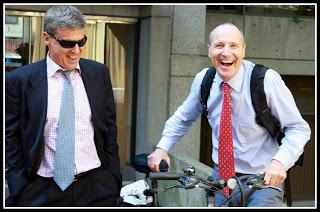 |
| Traveling in style |
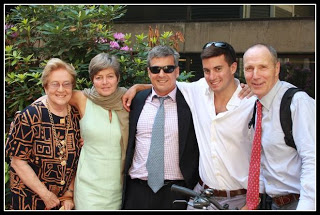 |
| Mike Way (far R), Jason Michas, and the Michas Family |
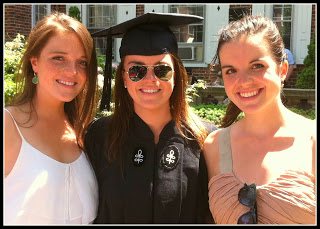 |
| Eliza “The Calinator” Calihan (center) and her sisters |
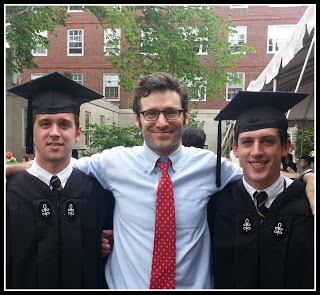 |
| (L to R) Charlie Cabot, Asst. Coach Luke Hammond, Zeke Scherl |
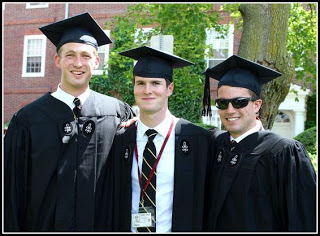 |
| (L to R) Roommates: Shaw McKean, Scott Prozeller (soccer capt.), Jason Michas |
CSA Scholar Athletes
Six men and five women from the Harvard team have been named CSA Scholar Athletes.
Men’s Team Scholar Athletes:
Shaw McKean, Charlie Cabot, Jason Michas, Gary Power, Brandon McLaughlin and Tommy Mullaney
Women’s Team Scholar Athletes:
Georgianna Brinkley, Laura Gemmell, Natasha Kingshott, Eliza Calihan and Natasha Anzik
Way to go guys!
Here are the releases for the men and women.
Gary Power’s Heroics Profiled in The Crimson
This is a great article on Gary’s epic tie-breaker in the national semi-finals. It was a battle that will be talked about for years to come.
From the Harvard Crimson:
Individual Performance of the Year, Runner-Up: Gary Power, Men’s Squash
By DAVID FREED
For two sets, junior Gary Power didn’t have enough.
With the Harvard men’s squash team tied with the Princeton Tigers, 4-4, in the national semifinals, Power was the team’s final hope. Four players who had lost to the Tigers in the previous matchup, a 5-4 defeat on Jan. 13, had scored victories on the day. Then junior Ali Farag—who had never lost in his collegiate career—fell in three sets. The four Crimson players who had scored victories against their Tigers opponents a month earlier in Cambridge had fallen one by one. A spot in the national championship, which had eluded Harvard in 2012, was on the line; a rematch with Trinity awaited the winner.
“Farag had taken a big loss and our captain was out with an injury, and at the time we were not looking good at all,” Crimson coach Mike Way said.
Harvard’s No. 1 player before Farag joined the team, Power had since dropped in the team rankings. Playing the fourth line for the team, he had posted a dominating 11-3 record on the season. But against Princeton’s Dylan Ward, Power was in trouble. After dropping the first set, 6-11, he could not close a tight second set, 10-12, and entered the third with his back against the wall. All eight other matches had been settled in four sets or fewer; no player had dropped the first two sets and even managed to claim the third.
At this point, Way said he turned to an assistant coach and murmured that Power just needed the third set. For the player whom Way calls “the fittest guy in college squash,” the opening didn’t need to be large. Given an inch, Power would take a mile.
And, against the odds, Power fought back and took the third set, 11-7. He pushed the match to a fifth set by the same score in the fourth, sending Ward reeling. In the fifth, Power scored a third consecutive 11-7 victory to push the Crimson into the finals.
“There’s nobody more determined,” Way said. “If you put determination in a beast like that, you’re going to get something quite awesome.”
Although the team fell in the finals, 6-3, to Trinity, Way said that Power’s play will not be forgotten.
“I’ve only been here three seasons but that was the biggest moment I’ve ever seen,” Way said afterward. “For him to come out and do what he did was absolutely heroic.”
—Staff writer David Freed can be reached at davidfreed@college.harvard.edu.
See the original article here.
Peter Briggs: An Untarnished Legend
Article and images courtesy of
by Tom McDermott
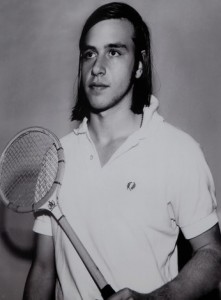
If squash and tennis coaches wore numbers on their warmup jackets, Peter Briggs’ might read 25, for the number of years he has taught at Apawamis Club’s courts. Then again, Briggs might want 108 on his back, signifying the number of college and high school team captains his squash program has produced, a number representing his own measure of achievement in his chosen profession.
The Greenwich native entered Harvard in 1969 after Middlesex, where he had excelled at soccer, tennis, and squash, a game he first picked up under Lester Cummings at the Field Club on days when tennis was rained out. That was a pivotal year for Briggs and the entire country, as campuses erupted in protests, first about Vietnam, and then, seemingly about everything else related to the establishment.
Briggs believes that practicing under his Harvard coach Jack Barnaby for three hours each day anchored him amidst the protests and major league partying. His collegiate career would culminate in three undefeated Ivy League team championships and two individual intercollegiate titles. Barnaby, who spent 60 years at Harvard, made a lasting impression on Briggs, not only as a good coach, but as a superb teacher and advisor, who told his teams, “The number nine match is just as important as the number one match; it’s one point for the team.”
The star pupil did not forget the lesson. In fact, the admittedly cocky young lefthander thought at the time, “If I ever have a chance to be able to give back what Coach Barnaby gave me, as a person and player, I will seize the opportunity.”
Briggs left Harvard with a degree in Classics, then set off on a Homeric tour, playing squash on money he’d earned working summers. He won the National Singles and Doubles titles in 1976, and started a sports apparel company, Boast, with partners.
Then, Briggs became a trader and, fairly quickly, head of the mortgage desk at Kidder, Peabody & Co. He married, lived the good life for several years, then divorced amicably. He tried an even bigger job at Merrill, Lynch, but his heart was no longer in it. After ten years on Wall Street, he felt adrift. One day he just walked away from it all.
Looking back at the period, the U.S. Squash Hall of Famer and perhaps the best left-wall doubles player ever, says he felt a sense of failure perhaps for the first time in his life.
Briggs talked things over with his dad, whom he considered his best friend. Both of his parents were English, and James Briggs was in the Royal Navy in World War II, when his ship, H.M.S. Harvester was torpedoed. He survived hours in the cold Atlantic and knew something about adversity. He had long been a steadying influence on his son, and this time was no different.
Briggs took time to travel, continued playing squash, and reflected. In 1984, the opportunity that Briggs had wondered about years before presented itself. Cornell University had an opening for a head squash coach. Briggs seized it, and began his apprentice-ship as a teacher and coach.
At Cornell, fortune continued to smile, and he soon met his wife, Di. The couple now reside in Pound Ridge with their sons, Cooper and Petey, and daughter Wellyn. Briggs spent four years honing his skills at Cornell. By 1988, he and Di began to feel that there was a life beyond academia and he heard that Apawamis was looking for a new pro. The club, which in those days had two igloo-like hardball singles and one doubles court, wanted Briggs.
Today, the teacher and coach looks out from his glass-enclosed shop upon a squash realm that is known throughout the country for its superior brand of junior squash. There are now six international singles courts and two doubles courts, and Apawamis remains a favorite tournament venue for top pros and the best area amateur players, many of whom starred for their college teams.
“I’m in the business of building self-esteem,” Briggs says. “I’m a teacher, who uses squash (or tennis) as a vehicle to give back what I was given.” Part of that giving back extends to his commitment to City Squash and other developmental programs.
What’s the biggest challenge? He’s diplomatic about a problem poking its head up in a hyper-competitive environment for young players, in which squash has become an admission ticket to the best schools, and a possible leg up in the quest for business success. There’s a lot of pressure on kids, who can sometimes forget they’re playing a game and it should be fun.
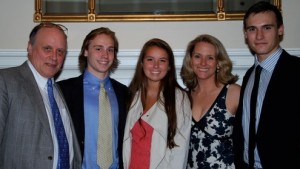
To anchor players of all ages, the Briggs Rules are posted courtside, one of which states in part, “Long after the silver trophy tarnishes, your reputation is all that is left.
Asked why he has stayed at Apawamis despite other opportunities, Briggs doesn’t hesitate, “It’s the people. The club members have treated me with respect and I respect them.”
Briggs’ cup shows no tarnish.
THE FIVE GOLDEN RULES OF COMPETITIVE SQUASH
Respect your opponent and give them the honor of trying as hard as you can every point.
Never take a point that your opponent doesn’t feel you deserve.
Always conduct yourself with your opponent as if you were having an interview for a job after the match.
Look the part and dress and have the body language of a champion.
Remember you are playing for your school first and then yourself. Long after the silver trophy tarnishes, your reputation is all that is left!

Post a comment